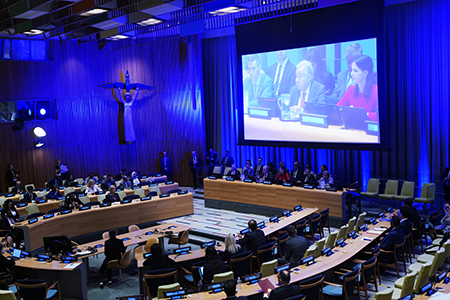UN Addresses the Promise and Perils of AI
November 2025
By Michael T. Klare
The United Nations has embarked on a major effort to assess the potential risks and benefits of artificial intelligence and to consider possible curbs on its future use.

During a series of meetings in late September, the Security Council and the General Assembly heard from senior government and industry officials on the need for increased international scrutiny of AI and the establishment of international mechanisms for its control.
In the first of these meetings on Sept. 24, the Security Council conducted an open debate on the implications of AI for international peace and security. Chaired by President Lee Jae Myung of South Korea, the event featured briefings by UN Secretary-General António Guterres and Yoshua Bengio, professor of computer science at the Université de Montréal and a leading figure in the field.
“Let us be clear: Humanity’s fate cannot be left to an algorithm,” Guterres told participants in the debate. “Humans must always retain authority over life-and-death decisions.” To prevent unintended consequences, he said, “military uses [of AI] must be clearly regulated through legal reviews, human accountability, and strong safeguards against misuse.”
Other speakers at the debate, including the senior officials of many UN member states, echoed those concerns. Khawaja Muhammad Asif, Pakistan’s minister of defense, noted that the May 2025 conflict between his country and India represents the first instance in which autonomous weapons “were used by one nuclear-armed state against another during a military exchange,” thereby demonstrating “the dangers which AI can pose.”
Many speakers, including Lee and UK Deputy Prime Minister David Lammy, called for adopting formal measures to control the use of AI use for military purposes. However, the principal U.S. delegate at the meeting, Michael Kratsios, the assistant to the president for science and technology, eschewed any sort of international oversight in this area. “We totally reject all efforts by international bodies to assert centralized control and global governance of AI,” he declared.
On the following day, the General Assembly conducted its own debate on AI’s risks and promises. Billed as the initial convocation of a “global dialogue on artificial intelligence governance,” the meeting was designed to enable delegates from UN member states to express their views on the subject.
Unlike the Security Council event, the General Assembly gathering did not consider the military dimensions of AI but focused instead on its social, economic, and scientific implications. Numerous delegates heralded AI’s potential to stimulate economic growth, develop life-saving medicines, and develop new energy sources, but also warned of its capacity to spread misinformation and curb human rights.
To address these issues and consider the possible adoption of measures to ensure the equitable use of AI for positive benefit and prevent its misuse, the General Assembly agreed to sponsor follow-up sessions of the global dialogue in 2026 and 2027. These gatherings, Guterres declared, “will take into account AI’s implications in all its dimensions—social and economic, ethical and technical, cultural and linguistic.”
He also said that the UN would establish an international independent scientific panel on artificial intelligence to be composed of 40 members who will “provide independent insights into the opportunities, risks and impacts associated with AI.”
